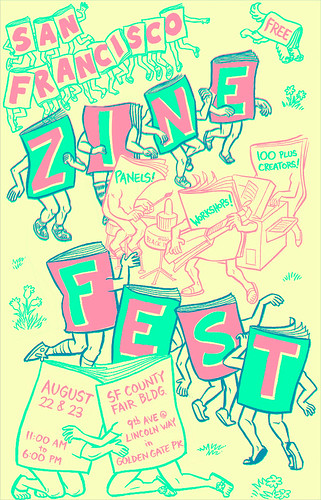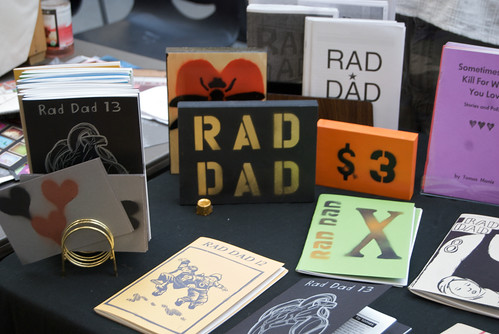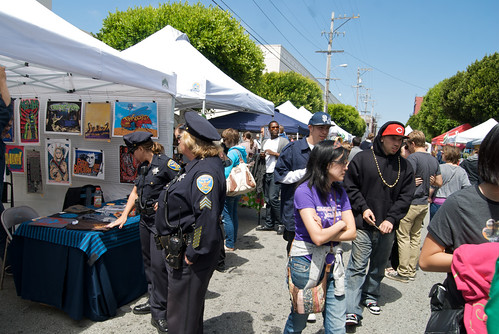Scissors, Glue, and Photocopies: DIY San Francisco
This weekend I fell in love with San Francisco again. On Sunday I rode my bike from the sunny Mission District into the fog of the Inner Sunset for the San Francisco Zinefest. I joined a small crowd of independent press connoisseurs for the second day of an all weekend event that included workshops and panel discussions on all things related to zine-making and doing-it-yourself: how to screen-print, bind books, and how to gouache paint. I meandered slowly through the tables, skimming zines and roaming back to the certain delicately crafted booklets that caught my attention—that I had to flip through at least six times before I made the decision to buy them. Among the booths were the local favorites in radical small press publishing, AK Press, Slingslot Collective, and independent press shops such as 1984 Printing, as well as lots of independent artists and writers with tables full of one of a kind or limited edition zines, pamphlets, crafts, t-shirts, buttons and on and on.
My first introduction to zines was in middle school. My friends and I hung out at a local, independent record store on the small downtown strip of our hometown that was next to a comic book store that specialized in baseball cards and across from the Planned Parenthood that quickly shut down. We would riffle through the free box pulling out advertising posters of our favorite punk bands and occasionally buy a CD or two. One afternoon, the infamous local punk, Mike handed us a small square of stapled paper. Mike was the real deal—he wore all black, had tattoos on his face, and he practically lived at the record store and knew every punk band and underground venue. On one side of the black and white xerox copied pages were drawings of jokers and a skull and crossbones, the other side was scribbled writing that attacked the prison industrial complex and urged everyone to go vegan. Unsure how these things related or what exactly I was suppose to do with this small stack of paper, but not wanting Mike, one of my idols, to think I was uncool, I accepted his offering. It wasn’t until a few years later that I finally understood the importance of Mike’s gesture and started seeking out zines for dialogues about similar political messages that Mike, the hometown punk, was attempting to raise consciousness about years ago. Irregardless of content, (although many are politically progressive and critical in nature) zines are inherently political. They operate outside of any corporate business model, don’t require approval from editors or distributors or sponsors. All you need is scissors, a gluestick, a copy machine, something to say and people willing to listen.
Two hours, twelve zines, one book, and three buttons later, my eyes were growing a bit weary from all the information packed into the folded paper and interesting type fonts. The County Fair Building was buzzing with the afternoon zine crowd—mostly people in the twenties or thirties, arriving on bicycles and with messanger bags slung over their shoulders and skinny jeans with patched knees. The zines I came away with were unintentionally themed around place, migration, or memory—somewhat predictable considering my interest in public space and all that relates to the topic of home. I bought two copies of Jennie Hinchcliff and Carolee Gillian Wheeler’s I Remember These Places When They Used To Exist and The Indifference of Places, both of which read astravel narratives of places familiar, foreign, and memories of places that no longer exist. expatriate by Janice Flux describes her current relationship with San Francisco as she prepares to leave her home of 12 years in the city and move indefinitely to Ireland, a country she gained citizenship to through her father’s mother. With her departure date one month away, Flux’s text was filled with urgent questions about what it means to belong somewhere, how you know when it’s time to leave, and what happens when the place you live stops being home. I read expatriate this morning on my twice-weekly 22 Fillmore bus ride to the Marina and couldn’t have imagined a more perfect environment to think about my own relationship to San Francisco.
Susie Cagle’s zine, This is what concerns me, also largely revolves around San Francisco. Cagle documents her everyday in the Tenderloin—from slipping on banana peels on the sidewalk to questioning the new surveillance cameras that have appeared on her block through carefully rendered comics with watercolor washes and intricately drawn facial expressions and posture. Cagle is working on a zine devoted to stories about volunteering with Food Not Bombs, which I can’t wait to read, having spent time with that organization myself, collecting almost-stale breads and leftovers from Rainbow Grocery to cook and serve throughout the city.
As I was getting ready to leave SF Zinefest there was an announcement made about an upcoming panel discussion, “Raising Kids and Raising Hell” that was to be led by Tomas Moniz, editor and creator of Rad Dad. Utne Magazine just named Rad Dad the best zine of 2009. I picked up two copies of issue 14 to find out for myself. I haven’t read all of it yet, however, if my brief conversation with Moniz is a testament to what is written in the pages, I’m already convinced of the zines’s merits. Moniz, a father raising his kids in the East Bay, is working hard to break apart the family as we know it. Rad Dad is dedicated to conscientious parenting and providing resources for families raising their kids to be politically and socially aware. The zine features queer parents, transgender parents, parents of color and parent allies—a term I am glad to know exists!
With all the talk lately of the nearly bankrupt newspaper companies and print periodicals, I was happy to be in a place where that is a moot point. Zinesters remain unaffected by the economic downturn because they never relied on it in the first place. Yes, there is the cost of printing, which I’m sure has increased over the years and free photocopies are more and more difficult to come by (damn Kinkos!), but the demand for something hand-made offering practical information, political viewpoints and personal stories is alive and well despite any recession or lack of funding for the arts, as the Zinefest proved. In the world of online social networking, when everyone is going paperless and digital, and yes, I’ll say it, blogging, it is a treasured experience to actually hold a home-made book in your hands. I think I spent ten minutes admiring the stitched binding of one zine and at least a good two minutes running my hands across the embossed letters on the title page of another. (Someone told me once that new Mac computers offer a “zine application” where with the wave of a magic, tech savvy wand a zine can be made via computer screen. I can’t really remember the details and I don’t really care. Call me old school, but the cutting and pasting and the xerox copy machine that jams at least twenty times are the blood, sweat, and tears of zine-making).
I biked back to the Mission District to take part in yet another do-it-ourselves event called Rock Make. Sunday marked the second annual Rock Make, a street festival that crowds one block of Treat Street with local crafters selling homemade jewelry, clothes, books, patches, and two stages for local bands. Rock Make was initiated by the Brian Gorman and Lynne Angel of the local band, Tartufi. Last year Rock Make took place the same weekend as San Francisco’s Outdoor Lands Music and Arts Festival, an enormous concert that takes over Golden Gate Park, costs lots of money, and features non-local blockbuster musicians like Dave Matthews Band, Pearl Jam, and Tenatious D. Rock Make, on the other hand, stretches a modest one block, is totally free, and includes all local, emerging artists and musicians. This year, Rock Make took place one weekend before the Outdoor Lands event, but the intention of offering an alternative that takes the local, San Francisco element to heart still holds true. Why spend over $100 on a ticket to a concert to hear popular radio musicians when you can see underground, independent, and experimental music for free?
Maybe it was all the zine reading about place, the stories about San Francisco and the crowds of people gathered together conversing across tables about radical pedagogy or tapping their feet in unison to live music, but I felt really excited about San Francisco this weekend. San Francisco is a city where there are alternatives to mainstream, corporate sponsored cultural events and institutions and then there are alternatives to those alternatives, too. As much as this had to do with the reputation and lure of the city, it may speak to the character of my generation, as well. I know, I know, I am part of a generation supposedly trademarked by cynicism, irony, and apathy, and that is there, of course, but there is also a genuine interest in developing sustainable connections based on shared politics and consciousness raising. There are groups of people who put into action artistic practices and ways of being with one another that don’t revolve solely around commerce or what it means to “make it” as an artist, writer or musician but rather, retain an independent, do-it-ourselves and do-it-together mentality—who critique the status quo while simultaneously creating other avenues for artistic expression and community building. And for this, I am grateful.





